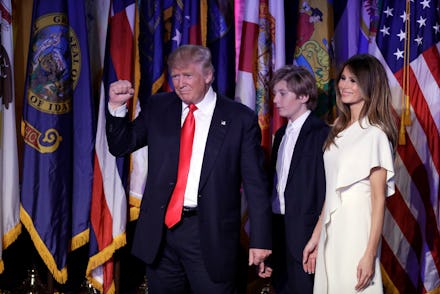How did Donald Trump win the election? Experts weigh in.

On election night, Americans stared in disbelief as the votes came in — slowly but surely — in favor of an outcome that no pollster had seen coming: a Donald Trump presidency.
As Trump, the new president-elect, delivered his victory speech to a crowd of supporters in the early hours of Wednesday morning, a stunned electorate turned its hive mind to a question whose answer was not immediately clear: How had it happened? How had Trump, a long-shot candidate from the first, quickly solidified his lead in states that no political wonk had believed he'd even had a shot at winning?
Below are some theories from experts on how the Trump presidency that no one saw coming came to be.
Political antithesis
The Guardian's Washington correspondent David Smith threw out a few theories for Trump's unexpected success at the polls, with Democratic rival Hillary Clinton's unpopularity and political antithesis chief among them.
"The Democrats had held the White House for eight years," Smith wrote. "Clinton would have been the first candidate since George H. W. Bush in 1988 to extend one party's hold for a third term. Even Obama's high approval rating evidently did not dim the appetite for his direct opposite."
Opposition to the political establishment
During an October stopover on NBC's Meet the Press, famed liberal documentarian Michael Moore attributed Trump's success as a candidate to growing unrest among a large an disenfranchised swath of the electorate that was hungry for an anti-establishment candidate, The Hill reported.
"Across the midwest, across the Rustbelt, I understand why a lot of people are angry," Moore said. "And they see Donald Trump as their human Molotov cocktail that they get to go into the voting booth on November 8 and throw him into our political system. I think they love the idea of blowing up the system."
A simple, resonant message
In October 2015, the Washington Post posed the question of Trump's popularity to Stanford University psychologist Jeffrey Pfeffer, who attributed it in part to the candidate's power of oratory. Voters, he reasoned, don't care as much about the substance of what a politician is saying as they do about the bravado with which it's said.
"They're responding to dynamism, to force, to movement, to smiling, to facial expressions that convey authority," he said. "[Trump] does it with more force. He does it with more energy. Energy is contagious."
The million-dollar word: Racism
Sometimes, the simplest explanation is also the right one, and the instance of Trump, it seems more than possible that a candidate who ran on a platform of rampant racism and xenophobia appealed to a country where racist and xenophobic attitudes are rampant.
Republicans broadly supported Trump's proposed "shutdown of Muslims" entering the US, NPR reported. And a CNN article from 2015 explored the way white Americans felt increasingly "displaced by minorities and immigrants."
Trump's prescient slogan, "Make America Great Again," and its harkening to a nostalgic past served as a dogwhistle to those enclaves of American voters. To some, it was code for, "Make America White Again."